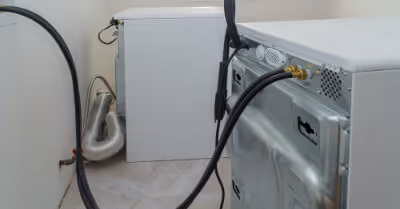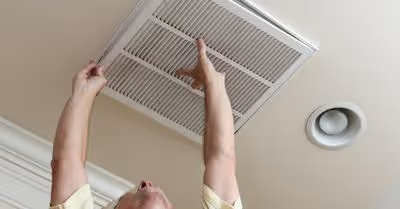Table of Contents
About Home Warranty Insurance
As a homeowner, you may come across various unexpected expenses. For instance, your dishwasher may break or your entire plumbing system may start to malfunction.
Eventually, these emergencies may turn into major issues, especially if you don’t have the money to deal with them at the moment.
Therefore, then it’s important to protect your home and your possessions from such unforeseen circumstances. And this is where home warranty comes in.
So, what is a home warranty? As noted earlier, home warranty is a service contract, which covers the cost of repairing or replacing household appliances and systems when they break down, due to normal wear and tear.
Home warranty will help to replace key systems like ventilation and air conditioning systems, electrical and plumbing, as well as major appliances like dryers, ovens, water heaters, dishwashers and refrigerators, among others.
It’s important to note that home warranty is different from home insurance. Home warranty mainly covers major appliances and systems while home insurance covers home and property damage.
How Does Home Warranty Work?
Just like home insurance, you will be paying monthly premiums to a home warranty company to ensure the contract remains active.
If a household appliance or system breaks down or malfunctions due to age or normal wear and tear, then you will file a claim with your home warranty company.
Once the home warranty company receives the claim, they will then send a service contractor to your house, who will assess the damage and then file a report.
After receiving the report, the warranty company will then determine the cause of the issue and whether it’s covered in your service contract.
If your claim is approved, then the warranty company will send their technician to replace or repair the appliance.
After replacing or repairing the appliance, the warrantor will bill you a deductible or fee, which is normally in the range of $60 to $120.
What Does Home Warranty Cover?
As we had touched earlier, home warranty insurance only covers major appliances and systems. The home systems covered under a home warranty include:
- Electrical systems
- Plumbing system
- Heating, ventilation, air conditioning and cooling systems
Some home warranties may also cover the septic system, depending on the coverage that you’ve chosen. As for the appliances covered, your home warranty will pay for the repair and replacement of:
- Water heaters
- Dishwashers
- Oven and range
- Dryers
- Garbage disposal
- Furnace
- Ceiling fan
A basic only covers major systems and key appliances in your house. However, you can purchase add-on coverage, for the appliances and fixtures not covered in the basic plan.
For instance, you can purchase add-on coverage for things like a second refrigerator, a water pump, garage door openers, hot tub or swimming pool, among others.
Windows, walls, doors, sprinkler systems, appliances that were already broken or in a poor state, and permit fees are not covered by home warranty.
How Much Does Home Warranty Cost?
On average, you will be paying between $300 and $600 per year for a basic home warranty plan. However, the actual amount will depend on various factors such as the plan you’ve purchased.
The actual cost will also depend on whether you’ve purchased add-on coverage, for those appliances and systems, which have not been covered in the basic plan.
You also need to remember that you will be incurring a service fee, every time your warranty company sends a contractor or a technician to undertake the assessments.
Service fees range from approximately $50 to $100 per every request that you make. The more the service requests that you make, the higher the service fee you will pay.
Depending on the basic plan you’ve chosen, the add-on coverage and the number of service requests that you make, you may end up paying approximately $1,000 for home warranty annually.
Can a Warrantor Deny a Claim?
Home warranty claims can also be denied. And your warrantor will give you reasons why they have denied your claim. Some of the reasons why your warrantor can deny your claim include:
The appliance is Not Covered
As discussed above, some appliances and systems are not covered by a home warranty.
Therefore, if an appliance or system that’s not covered breaks down, then your warrantor is within their right not to approve your claim.
Lack of Maintenance
Your appliances and systems should be regularly serviced. Servicing them regularly helps to keep them in great working condition. It’s also a requirement to receive coverage.
So, if a certain system or appliance breaks down due to lack of maintenance, then the warrantor can deny your claim.
Code Violations and Improper Installation
If a dishwasher, oven, heater or any other breaks down due to improper installation, then your claim may be denied. Also, if it violates safety codes, then the warranty company has the right to deny the claim.
Pre-existing Damage
Home warranty companies will not approve claims for appliances and systems that malfunction if the problem was already prior to the signing of the contract. And there is nothing much you can do in such situations.
To avoid such issues, homeowners should hire someone to undertake a thorough home inspection before signing the home warranty contract.
Unusual Wear and Tear
Home warranties only cover appliances and systems that break down, due to normal wear and tear.
Hence, if careless usage and rough handling caused the damage or malfunctioning, then there is a high chance the warrantor will deny the claim. And if you disagree with the diagnosis, then you can seek an opinion from another contractor.
Coverage Limit Exceeded
Your home warranty contract indicates how much you will be paid out for every system and appliance covered.
So, if your appliance breaks down and you’ve already reached the coverage limit, then your claim will be denied.
For instance, some warrantors will limit payouts per covered item, others may limit payouts per coverage period while some may place limits for both.
What Should You Do if Your Home Warranty Claim is Denied?
As you can see, your warrantor can deny your claim for several reasons. So, what should you do if your claim is denied? First, you will need to go through your contract document to ensure the claim denial is within the terms of the contract.
If you feel that your claim is unjustly denied, then should contact your home warranty company again and discuss the issue further.
You should also request the inspection report filed by the service technician. It will also be advisable to get a second opinion from another contractor.
If you have verifiable information that your claim was unjustly denied, then you can opt to file a claim in a claims court. You should also file a customer complaint with review websites like Better Business Bureau.
Most companies will want to avoid negative reviews as much as possible. And there is a high chance they may finally decide to approve your claim. But in the meantime, you should find a contractor to attend to the issue and pay out of pocket, to prevent inconveniences.
Benefits of Home Warranty Insurance
Home warranty insurance is designed to cushion you against expensive, unexpected repair bills. If you don’t have an emergency fund somewhere or you intend to use your emergency fund for something else, then a home warranty makes sense.
Also, if you are buying an old house or you are living in a house with older appliances and systems, then it will be a good idea to have home warranty insurance.
Home warranty insurance are also valuable for first-time homeowners, who may not know what to do or who to call whenever a system or an appliance breaks down. As long as you have home warranty, you just call your warrantor, and they will take care of the rest.
Potential Drawbacks for Home Warranty
While home warranty may give you some peace of mind, it’s not always ideal for everyone. And there are several reasons for this. First, home warranties don’t cover all systems and appliances.
Furthermore, home warranties will deny claims for improperly installed and poorly maintained systems and appliances.
And considering the definition of proper or improper maintenance is not always clear, the homeowner may be forced to bear the repair or replacement costs, even if they have been paying for their home warranty premiums without fail.
Another drawback of home warranty is that you don’t get to choose the service technician. Even if you don’t like the service offered, then you can’t do anything.
Should You Purchase Home Warranty?
Whether to purchase home warranty insurance is a personal choice. But if you opt to purchase home warranty, make sure you choose a reputable and reliable company. Platforms such as Better Business Bureau and other service review websites will show you the rating and reviews for each company. And once you’ve settled on a certain company, make sure you read the contract document carefully to ascertain the terms and conditions, prior to signing the paperwork.
Recent Articles
















